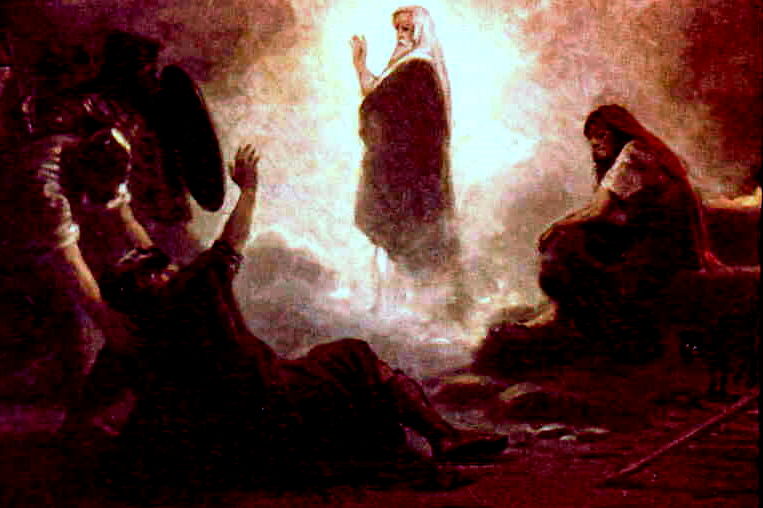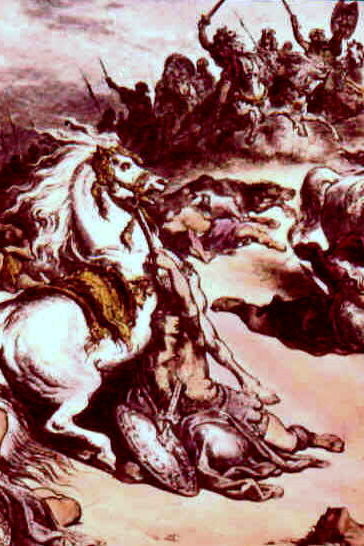THE LAST DAYS OF KING SAULI Samuel 28:1 to 31:13
ONCE more the Philistines gathered together to make war on King Saul and the land of Israel. The king of the Philistines, Achish, sent for David, and said to him, "You and your men shall go with me in the army, and fight against the men of Israel."
For David was now living in the Philistine country and under their rule. So David came from Ziklag, with all his six hundred men, and they stood among the armies of the Philistines. But when the lords of the Philistines saw David and his men, they said, "Why are these Israelites here? Is not this the man of whom they sang,
'Saul slew his thousands,
But David his ten thousands.'
Will not this man turn from us in the battle, and make his peace with his king by fighting against us? This man shall not go with us to the war."
Then Achish, the king of the Philistines, sent away David and his men, so that David was not compelled to fight against his own people. But when he came to his own city, Ziklag, he found it had been burned and destroyed; and all the people in it, the wives and children of David's men, and David's own wives also, had been carried away by the Amalekites into the desert on the south.
The Lord spoke to David through the high-priest, Abiathar, saying, "Pursue these men, and you will overtake them, and take back all that they have carried away."
So David followed the Amalekites into the wilderness. His march was so swift that a part of his men could not endure it, but stopped to rest at the brook Bezor, while four hundred men went on with David. He found the Amalekites in their camp, without guards, feasting upon the spoil that they had taken. And David and his men fell upon them suddenly and killed all of them, except four hundred men who escaped on camels far into the desert, where David could not follow them. And David took from these robbers all the women and children that they had carried away from Ziklag, and among them David's own two wives; also he took a great amount of treasure and of spoil, not only all that these men had found in Ziklag, but what they had taken in many other places.
David divided all these things between himself and his men, giving as much to those who had stayed at the brook Bezor as to those who had fought with the Amalekites. This treasure taken from the Amalekites made David very rich; and from it he sent presents to many of his friends in the tribe of Judah.
While David was pursuing his enemies in the south, the Philistines were gathering a great host in the middle of the land, on the plain of Esdraelon, at the foot of Mount Gilboa. Saul and his men were on the side of Mount Gilboa, near the same spring where Gideon's men drank. But there was no one like Gideon now, to lead the men of Israel, for King Saul was old, and weakened by disease and trouble; Samuel had died many years before; David was no longer by his side; Saul had slain the priests, through whom in those times God spoke to men; and Saul was utterly alone, and knew not what to do, as he saw the mighty host of the Philistines on the plain. And the Lord had forsaken Saul, and would give him no word in his sore need.
Saul heard that there was living at En-dor, on the north side of the Hill Moreh, not far from his camp, a woman who could call up the spirits of the dead. Whether she could really do this, or only pretended to do it, we do not know, for the Bible does not tell. But Saul was so anxious to have some message from the Lord, that at night he sought this woman. He took off his kingly robes and came dressed as a common man, and said to her, "Bring me up from the dead the spirit of a man whom I greatly long to meet."
And the woman said, "What spirit shall I call up?"
And Saul answered, "Bring me up the spirit of Samuel, the prophet."
Then the woman called for the spirit of Samuel; and whether spirits had ever arisen from the dead before or not, at that time the Lord allowed the spirit of Samuel to rise up from his place among the dead, to speak to King Saul.
When the woman saw Samuel's spirit she was filled with fear. She cried out, and Saul said to her, "Do not fear; but tell me whom you see."
For Saul himself could not see the spirit whom the woman saw. And she said, "I see one like a god rising up. He is an old man, covered with a long robe."
Then out of the darkness a voice came from the spirit whom Saul's eyes could not see. "Why have you troubled me, and called me out of my rest?"
And Saul answered Samuel, "I am in great distress, for the Philistines make war upon me, and God has forsaken me. He will not speak to me either by a prophet, or a priest, or in a dream. And I have called upon you that you may tell me what to do." And the spirit of Samuel said to Saul, "If the Lord has forsaken you and has become your enemy, why do you call upon me to help you? The Lord has dealt with you as I warned you that he would do. Because you would not obey the Lord, he has taken the kingdom away from you and your house, and has given it to David. And the Lord will give Israel into the hands of the Philistines; and to-morrow you and your three sons shall be as I am, among the dead." And then the spirit of Samuel the prophet passed from sight. When Saul heard these words he fell down as one dead, for he was very weak, as he had taken no food all that day. The woman and Saul's servants who were with him raised him up, and gave him food, and tried to speak to him words of cheer. Then Saul and his men went over the mountain to their camp.
On the next day a great battle was fought on the side of Mount Gilboa. The Philistines did not wait for Saul's warriors to attack them. They climbed up the mountain, and fell upon the Israelites in their camp. Many of the men of Israel were slain in the fight, and many more fled away. Saul's three sons were killed, one of them, the brave and noble Jonathan.
When Saul saw that the battle had gone against him, that his sons were slain, and that the enemies were pressing closely upon him, he called to his armor-bearer, and said, "Draw your sword and kill me; it would be better for me to die by your hand than for the Philistines to come upon me and slaughter me."
But the armor-bearer would not draw his sword upon his king, the Lord's anointed. Then Saul took his own sword and fell upon it, and killed himself among the bodies of his own men.
On the next day the Philistines came to strip off the armor and carry away the weapons of those who had been slain. The crown of King Saul and the bracelet on his arm had been already carried away; but the Philistines took off his armor and sent it to the temple of their idol, Dagon; and the body of Saul and those of his three sons they fastened to the wall of Beth-shan, a Canaanite city in the valley of the Jordan.
You remember how Saul, in the beginning of his reign, had rescued the city of Jabesh-gilead from the Ammonites. The men of Jabesh had not forgotten Saul's brave deed. When they heard what had been done with the body of Saul they rose up in the night and went down the mountains and walked across the Jordan, and came to Beth-shan. They took down from the wall the bodies of Saul and his sons, and carried them to Jabesh; and that they might not be taken away again, they burned them and buried their ashes under a tree; and they mourned for Saul seven days. Thus came to an end the reign of Saul, which began well, but ended in failure and in ruin, because Saul forsook the Lord God of Israel.
Saul had reigned forty years. At the beginning of his reign the Israelites were almost free from the Philistines, and for a time Saul seemed to have success in driving the Philistines out of the land. But after Saul forsook the Lord, and would no longer listen to Samuel, God's prophet, he became gloomy and full of fear, and lost his courage, so that the land fell again under the power of its enemies. David could have helped him, but he had driven David away; and there was no strong man to stand by Saul and win victories for him. So at the end, when Saul fell in battle, the yoke of the Philistines was on Israel heavier than at any time before.


